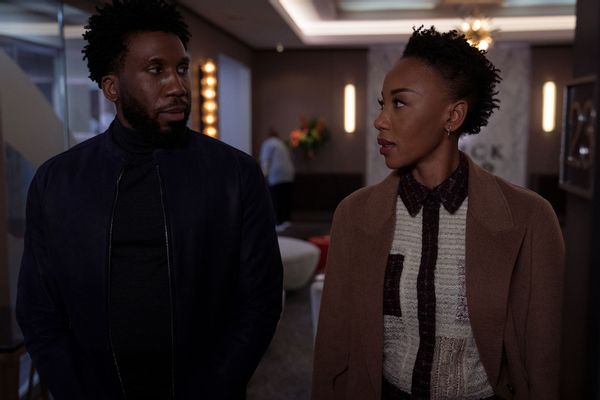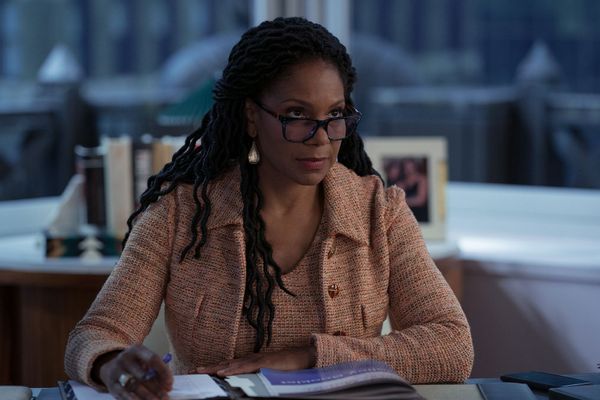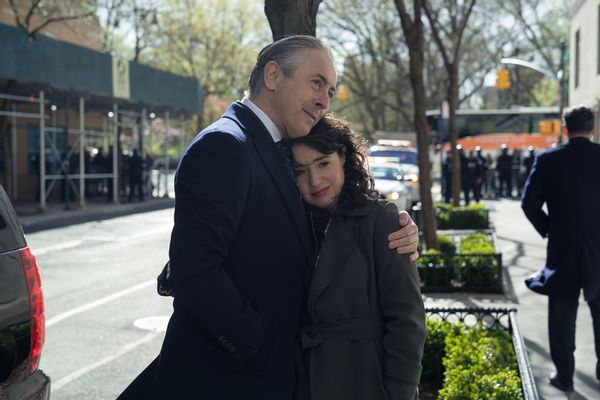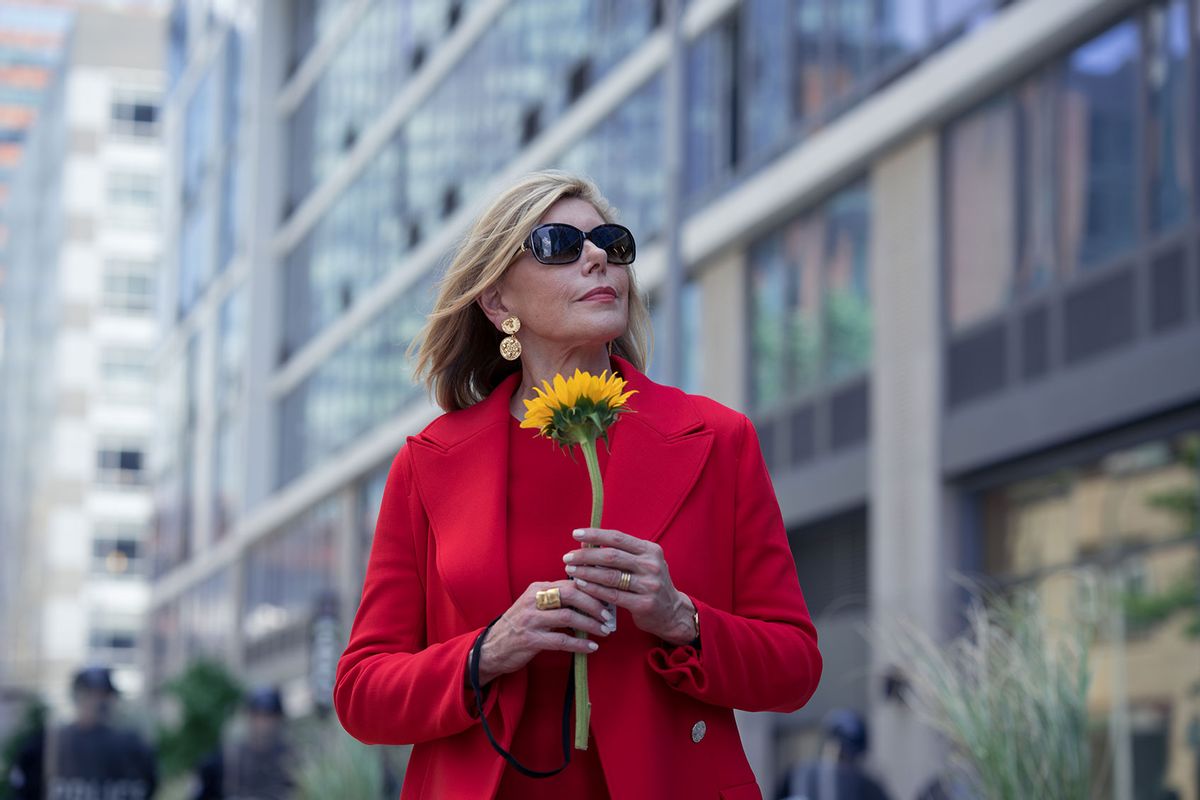The signature image of the sixth and final season of "The Good Fight" features Christine Baranski's Diane Lockhart holding a sunflower, beaming serenely with her sunglasses on.
This comes from a scene where she's just received a dose of a therapeutic psychedelic called PT-108, administered by the handsome Dr. Lyle Bettencourt, played by the handsome actor John Slattery.
Diane's view of the world takes on a golden hue as she exits his office softly singing a few bars to "Something's Coming" from the musical "West Side Story." She carries her feather-light mood down the street with her, past lines of police in riot gear and the incessant din of protests outside of her that never seems to let up.
Then she runs into her firm's new name partner Ri'Chard Lane (Andre Braugher), petting his expensive suit and claiming one of the beverages he's carrying for herself; although he didn't get it expressly for her, he lets her have it. The world around them is enveloped in tear gas, screaming and regular sounds of explosions.
Despite all that Diane can't help but see the beauty in the world, expressed in a gently acoustic version of the theme to "The Mary Tyler Moore" show playing underneath her spaced-out dialogue: "You're going to make it after all!"
Throughout its six seasons, "The Good Fight's" Diane has dabbled in various ways of coping with the world's madness and her inability to keep it at bay. Early in the series she turns to Aikido and microdosing, but eventually her rage makes her too dangerous to practice the former while her psilocybin experimentation made the people around her ask questions.
She traded in martial arts for ax throwing and magic mushrooms for intravenous drips of a psychoactive chemical that somehow makes her very affectionate to the people around her while seeming to care a lot less. This is healthier than the doom-scrolling fueling the "crazy carnival ride" she tells Dr. Bettencourt that society has become.
It also must be said that her decision to take this path is completely understandable. Chaotic civil unrest in the streets outside of the firm's office building is a regular feature this season, ensuring there's never a moment of absolute peace within the office. Nobody knows what the protests are for; we're made to understand that they're for and against anything and everything, where everyone is an aggressor.
But the act that sends Diane fleeing into wonderland involves someone lobbing a fake grenade into the midst of Diane, Liz, the firm's investigator Jay Dipersia (Nyambi Nyambi), new associates Marissa Gold (Sarah Steele) and Carmen Moyo (Charmaine Bingwa), as they're riding an elevator at the end of the workday.
The decoy contains a message assuring them the next one would be real, alongside an ominous date: 11/10.
Afterward, a shaken Diane seeks a chemical way to "step outside herself." But Marissa, Carmen, Liz and Jay somehow keep trudging on.
 Nyambi Nyambi as Jay Dipersia and Charmain Bingwa as Carmen Moyo in "The Good Fight" (Elizabeth Fisher/Paramount+)
Nyambi Nyambi as Jay Dipersia and Charmain Bingwa as Carmen Moyo in "The Good Fight" (Elizabeth Fisher/Paramount+)
Subsequent episodes reveal that the threat is from extremists targeting Black institutions and influential Jewish people, as Marissa finds out when her father Eli Gold (Alan Cumming) nearly has his head blown off.
It's impossible to miss how extensively Diane's internal perspective on an ever-maddening world is explored and featured compared to those of Liz and her Black and Jewish colleagues.
After that, Marissa enrolls in Krav Maga classes while Jay becomes involved in an underground resistance effort run and funded by a Black leader played by Phylicia Rashad. The inference is obvious – regardless of how wealthy and connected these folks are, they're also members of marginalized, persecuted communities. They don't have the luxury of checking out from their trauma or letting down their guard. That might get them killed.
Baranski has played Diane Lockhart for 13 years and across two legal dramas starting with "The Good Wife" which, like "The Good Fight," is also a Robert and Michelle King creation. The Kings didn't initially use Diane as a trojan horse character – as in, a white character played by a famous actor leading us into a story featuring Black people and Black perspectives.
In fairness, that concept isn't a simple fit for her character in "The Good Fight" since Christine's peers and former name partners Adrian Boseman (former co-star Delroy Lindo, who left after Season 4) and Liz Reddick-Lawrence (Audra McDonald) have a substantial level of influence at the highest levels of local and national politics.
 Audra McDonald in "The Good Fight" (Elizabeth Fisher/Paramount+.)
Audra McDonald in "The Good Fight" (Elizabeth Fisher/Paramount+.)
But it's impossible to miss how extensively Diane's internal perspective on an ever-maddening world is explored and featured compared to those of Liz and her Black and Jewish colleagues. This is not a critique, but an appreciation of how the show employs Diane's paradigm as a strategic tool.
Diane was a prickly heroine in "The Good Wife" humbled by losing her retirement and wealth, forcing her back into the workplace at Adrian's invitation, without much of a stake to offer the majority Black institution she joins other than her experience, her name and yes, her white privilege.
Throughout "The Good Fight" Diane, a firebrand liberal, sought to use that aspect of her power for good, pulling strings her colleagues could not to protect the people in her orbit who aren't as wealthy or connected – or in the case of fellow equity partner Julius Cain (Michael Boatman), a loyal Republican, happen to have all the correct credentials to access power except for the right skin color.
Nevertheless, "The Good Fight" has consistently placed Diane in situations that force her to contend with the fact that she will always be part of the problem, regardless of what she does or the righteousness of her battles, by virtue of her identity.
She has rebelled against her circumstances, as she did in Season 5 when Black associates at the firm demanded that she step down as the firm's name partner because of the clients with whom she worked, several of whom are demonstrably prejudiced. She eventually concedes and steps down to equity partner status valuing the health of the firm and her partnership with Liz over her ego.
(Besides, the larger problem has been, and continues to be, the patriarchal overlords running STR Laurie, the multi-national legal firm of which Reddick & Associates is a subsidiary.)
 Alan Cumming as Eli Gold and Sarah Steele as Marissa Gold in "The Good Fight" (Elizabeth Fisher/Paramount+)
Alan Cumming as Eli Gold and Sarah Steele as Marissa Gold in "The Good Fight" (Elizabeth Fisher/Paramount+)
But this sixth-season subplot featuring Diane's latest and, it must be said, highly bespoke means of turning off her trauma is a unique way of making a viewer contemplate her place in the show's dialogue with real-world inequity and injustice. Politically speaking, Diane is fighting on the side of liberal feminism, mourning the overturning of Roe v. Wade, the destruction of voting rights protections, the resurgence of the Cold War, and the creeping assault on American democracy by the extreme right.
"I just realized I may have the most power because I don't have any power!" Diane says.
She's also married to a conservative operative, Gary Cole's Kurt McVeigh, who works with the NRA and, without Diane knowing it, undermined Liz's power with STR Laurie's leadership. Kurt chatted them up during a hunting trip. Of course.
At the end of the day – Nov. 8, to be precise – it will be white women who determine whether our democracy holds or fails. Black women and other women of color receive attention and credit for getting out the vote in their communities and are hailed as saviors when their work pays off, but white women have the numbers.
They also have the privilege of voting based on their personal needs and feelings instead of considering the overall health of the body politic. They can comfortably vote against their best interests in the long term purely in reaction to short-term irritations, like how a candidate seems instead of the substance of their platform.
Presenting Exhibit A:
Anyway. Diane acknowledges this, doing what she can with her influence to balance the scales in her corner of the universe.
She has, in her way, earned her mental vacations and using her temporary flirtations with enlightenment to aid the cause of securing justice for those to whom it doesn't come as easily. And frankly, in this slightly off-kilter version of our world and its precarious legal, political, and cultural state of affairs, her mind trips are the main source of comedy. Through a sky-high snorting giggle she tells Ri'Chard, "I just realized I may have the most power because I don't have any power!"
Want a daily wrap-up of all the news and commentary Salon has to offer? Subscribe to our morning newsletter, Crash Course.
I should clarify, they provide the smiles in the episodes that don't replace the loud protests with the delightful chaos of a children's party at a judge's home, which happened in the sixth episode.
Attorneys argue their case amid screaming children, a cascade of bubbles, and a clown running circles around them. Highlighting small absurdities like this make "The Good Fight" one of the best shows on TV.
The Kings and the drama's writers employ these bits sparingly, enough to provide some release from the anxiousness choking the air like tear gas. This aligns with what Robert King told Salon at the end of Season 5: "[T]he more pessimistic the show is, the more it has a smile on its face."
It's impossible to predict whether "The Good Fight" will lay down its gloves with a grin in its finale episode, which is currently scheduled to debut on the date printed on that fake explosive: Nov. 10. Something tells me, though, that Diane will be just fine regardless. What happens to everyone else, though, may color how we'll feel about that.
"The Good Fight" streams new episodes Thursdays on Paramount+.



Shares